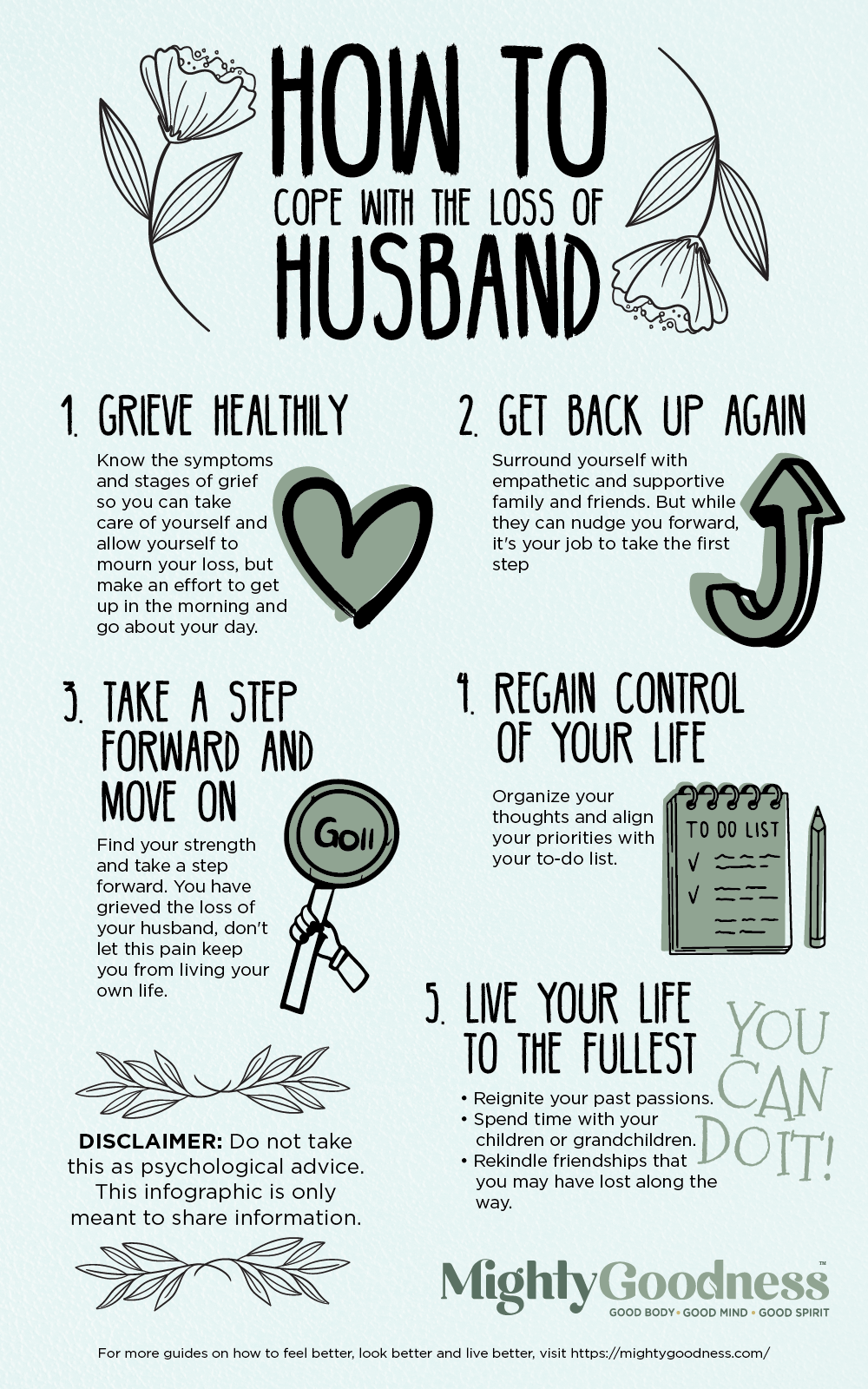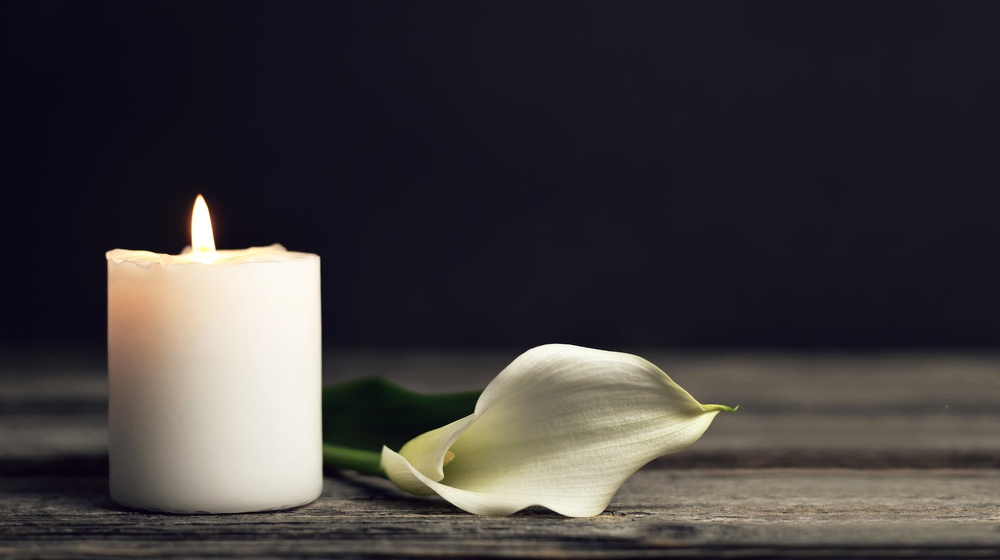Grieving for the loss of husband or other things can be a difficult and long process. We take our time to grieve but it's also important to learn how to cope and move forward little by little.
RELATED: Turning 50 Gracefully | How to Cope with Turning 50
Life after the Loss of a Husband
Click here to jump to the infographic

How Do I Grieve Healthily?

There is no one way to grieve.
There are many ways you might grieve. But there are five common stages of grief:
- Denial – You can't accept what happened
- Anger – Trying to place blame on someone or something
- Bargaining – Trying to change what happened, attempt to control the situation
- Depression – When you face the reality of the situation
- Acceptance – Accepting your loss
You might not go through all the stages in order. You might not even go through all of them. And for some, these stages are part of their recovery.
What's important is that you grieve healthily. And it takes a good balance between grieving and getting back to your daily life.
Grieving is a draining process. Imagine a weighing scale with two platforms. When you pour all your energy into one, it tips the scale.
While it might be difficult to go resume your normal life, it's important to take care of yourself. Allow yourself to mourn your loss, but make an effort to get up in the morning and go about your day.
Be kind to yourself.
Take your time and allow yourself to grieve the loss of your husband. It's okay that you can't bounce back to your old self and aren't as productive as before. And no one expects you to force a smile.
Most of all, no one will expect you to struggle alone.
Share your feelings with your loved ones or close friends. Talking about fond memories might help you cope with the loss, and soon, cope with it.
Keeping a journal can also help you air out your feelings while still keeping them private. Let your family and friends help you, and open up to them when they reach out.
But if you're having trouble grieving, seek a grief counselor. Your grief counselor can teach you how to cope with the sudden loss of your husband.
Grieving lets you empty your cup so that you can fill it up again. It's a process that concludes with acceptance and peace with the loss of your husband.
What Are the Symptoms of Grief?

Grief weighs heavy on your mental health. You might have trouble focusing on daily tasks. Know that these are normal and common among those who have experienced the loss of a husband or partner.
It's okay to have to feel these things. You can also expect some mental setbacks.
Here are other symptoms of grief:
- shock, disbelief
- sadness
- guilt
- fear
- anger
- difficulty concentrating
- difficulty in making decisions
But these mental or emotional symptoms of grief have spill-over effects on your physical health. These include:
- fatigue
- nausea
- weakened immune system
- weight gain/loss
- pains, aches
- insomnia
You're allowed to take your time to grieve. But when you have prolonged grief, trouble accepting the loss of your husband, and can't go about your daily tasks, you may be experiencing complicated grief.
Complicated grief is when you're unable to move on from your loss.
It is different from depression, but they do share some similar traits. However, prolonged bereavement may lead to the development of depression.
When you have lost your purpose in life or will to live, it might be time to seek professional help.
What Happens to Me Now?

Take your time to grieve, but it's crucial to get back up again.
You may have spent the majority of your life building a life with your husband. And now, all responsibilities fall on your shoulders. It's up to you to pay the bills and care for your family.
If you have children or parents that rely on you, take this as motivation to steel yourself.
Surround yourself with empathetic family and friends who can support you through this journey. But while they can nudge you forward, it's your job to take the first step.
Repeat these kind phrases to yourself:
- I am stronger than I think.
- I can cope, and I can overcome this.
- I am an independent woman, and I will survive.
- It's all going to be okay.
- I can start over.
RELATED: 9 Lifestyle Changes That Ended My Fear Of Turning 50
Where Do I Go from Here?

You finally found your strength to stand up, but where do you go from here?
Moving on from pain does not mean you forget the loss of your husband. You're not dishonoring his memory when you move on.
Find your strength and take a step forward. You have grieved the loss of your husband, don't let this pain keep you from living your own life.
Now that you have newfound strength, it's time to regain control of your life.
How Do I Regain Control of My Life?

Now that the dust has settled, it's time to sit at your work desk and settle the paperwork.
Organize your thoughts and align your priorities with your to-do list. Your checklist might include:
- Sorting through your assets and transferring all your properties under your name
- Updating your retirement savings and healthcare insurance
- Getting in touch with a lawyer to settle your husband's estate and will
- Plotting a year's worth of bills and making sure you can settle these
- You might also write a will of your own
When you're ready, go through your husband's belongings. Keep important keepsakes and memorabilia. Your children or grandchildren might also want to take something of sentimental value.
Other things that you will no longer need (like clothes), you can donate.
How Do I Live My Life to the Fullest after the Loss of a Husband?

Here's an infographic guide that you can use. Feel free to download, save and share it with your loved ones:

Some say that courage is the lack of fear. But courage is not knowing what's in front of you and still taking a step forward.
The loss of a husband is not the loss of oneself. You are your own person outside your marriage.
Reignite your past passions. Spend time with your children or grandchildren. Rekindle friendships that you may have lost along the way.
Develop new meaningful friendships. Do what it takes to make you feel like you again.
Rediscover yourself and rebuild or continue the life you have.
Watch this video to hear Celine Dion's advice on how she coped with the loss of her husband:
Grieving is not an uphill battle since that would suggest that it's a linear process. Instead, it's a twisted roller coaster that only you can navigate. But know that there is a peaceful conclusion to it.
Coping is not a means to forget those who you have lost. It's a matter of getting back in the saddle and living to the fullest once again.
It's breathing life back into your body and caring for your mental health.
How would you cope with the loss of a husband? Share your thoughts with us in the comment section below!
Up Next:
- How to Start Dating in Your 50's
- 10 Important Things To Do When You Turn 50 Years Old
- 9 CoQ10 Benefits | Coenzyme Q10
If you’ve got the gift of keeping healthy and sharing this knowledge through writing, click here if you want to write for us.
Please stay connected with us on Facebook, Pinterest, Instagram, and Twitter. Join our community here and Feel Better, Look Better and Live better with us.
Trending
Get Updates
SIGN UP FOR OUR NEWSLETTER TODAY

Tongue Color | 7 Scary Tongue Color Meanings

Lecithin Benefits and Side Effects: 10 Surprising Truths

Related

Tongue Color | 7 Scary Tongue Color Meanings

